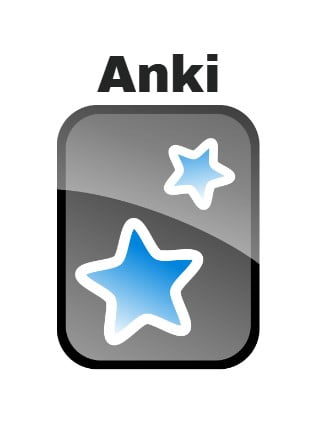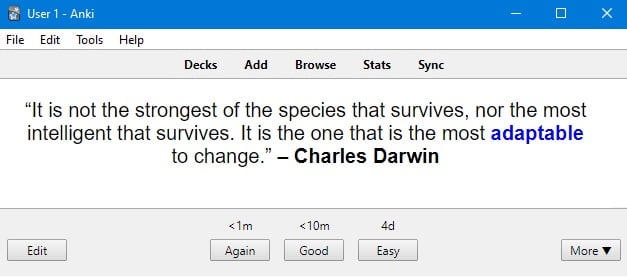There are a number of research-backed ways to use Anki effectively. The most important tip is to be thoughtful. Rather than copy-pasting your cards, you take time to phrase them in your own words.
Furthermore, you could study with ear muffs because it helps with focus. Or you could check out my previous article How to Study Effectively, where I covered the fundamentals of learning and memory.

But in this article, we’ll go in-depth with how to create the perfect flashcard and why it might help to think extreme thoughts.
1. Learn Then Memorize
Avoid copying and pasting facts onto your Anki cards. You need to understand the whole and how the part relates to it. For instance, there can be at least 2 reasons why you can’t speak. One is damage to Broca’s area, the other is an injury to the brain stem. The difference is knowing where both are located.

2. Minimum Information Principle
Although it’s possible to memorize difficult concepts, difficult concepts are as the adjective describes “difficult”. The more words you use the greater the chance that you will get your facts mixed up. The smarter move is to break concepts down into shorter units and practice those units on their own. This is also much more enjoyable.
Instead of:
- “Phrenology (from Ancient Greek φρήν (phrēn), meaning ‘mind’, and λόγος (logos), meaning ‘knowledge’) is a pseudoscience that involves the measurement of bumps on the skull to predict mental traits.“
You could use:
- “Phrēn is Ancient Greek for the mind.”
- “Logos is Ancient Greek for knowledge“
- “Phrenology is a pseudoscience that claims you can tell personality characteristics from the shape of someone’s skull.“
3. Make it Memorable. The Unordinary Stands Out.
For instance, King Henry Died Ugly Drinking Chocolate Milk, could help with remembering metric conversion:
Kilometer(1000), Hectometer(100), Decameter(10), Meter(1), Decimeter(0.1), Centimeter(0.01), Millimeter(0.001).
4. Paraphrase it Into Your Own Words
Memory is a constructive process. This means that when you remember something then you remember the last time you thought about it and not the original version of the memory. Each time we think about a memory we recreate it.
For instance, think about your name. Do you remember when was the first time you heard it? Or do you simply know that it is your name? I think you will agree that you don’t know when the first time was.
Paraphrasing forces you to engage with the material. This is known as elaborative studying(1). But to get the most out of it you need to get into the nitty-gritty. Make it as detailed but as parsimonious as possible. Ask why when it makes sense to do so.
5. Self-Reference Effect – Make it Personal, Be Selfish.
A 1977 study found that people had significantly better recall when adjectives were closely related to them(2). Another 2010 study concluded: that people remember birthdays that are close to their own better than distant birthdays(3).
If you can associate a fact with your own life you’re more likely to remember it. For instance, in an article about the passwords people use, the first conclusion the author made is: “Passwords are inspired by words of personal significance or other memorable patterns.“
6. Take Time to Create Your Cards
Quality Anki cards take time to create. Don’t use shared decks. Start creating your cards early so you have to time invest in getting a deeper understanding. I know it might seem like you’re saving some time but in reality, you’re just losing in terms of quality. It’s quality not quantity that determines if you develop understanding.
But don’t waste your time either. Check out Anki keyboard shortcuts.
7. Don’t Delete Once You Succeed
Memory is deceptive. No need to delete something if you think you’ve mastered it.
8. Hitchen’s Razor
It’s a nice way to always know where you got your information from. To clarify your thought and or card. The great Christopher Hitchens once said: “What can be asserted without evidence can also be dismissed without evidence.” It’s good practice to know your sources.
9. Be careful with similarities (e.g. affect, effect)
Affect is a verb, effect is a noun. The articles on this website might affect you to become the best version of yourself, and then people might start calling it the Laymn Effect.
10. Pareto Principle: 80% of results are from 20% of actions.
Exams are not a perfect example of Pareto distribution. But when cramming for an exam and each answer only gives 1 point, then do not spend your focus on hard concepts. If the reward is just 1 point, better to focus on easy and medium difficulty concepts because they will be easier to memorize. Make important and useful cards.
11. Stick to default settings. Slow and steady wins the race
I had a course on behavioral neuroscience. Because I was busy I only had roughly a week to learn 24 lectures worth of material. I ended up getting 90% in that exam but it was hard in the last few days. I noticed how slightly similar but different concepts started getting confusing.
I mixed up neurotransmitters and important peptides because I was doing more than the default settings suggested. Although I studied hard for the exam, in some ways I got lucky. Like the great Alex Honnold, the free solo climber, said: “I didn’t want to be a lucky climber. I wanted to be a great climber.”
12. Redundancy (Learn it Both Ways)
In psychology, there are a lot of theories from a lot of relatively unknown scientists. Jaak Panksepp is the father of affective neuroscience. He is famous in the scientific community and did important work, but he is not Darwin. Sometimes you need to remember the question and the answer. In those cases, it’s possible to use the reverse card option.
The reverse card switches the question and the answer so you remember the information both ways. So another way of remembering that information is by asking: “Who is the father of affective neuroscience?” Instead of: “Jaak Panksepp is famous for…”

13. Image Occlusion Enhanced Plugin for Anki
This plugin is amazing. It allows you to quickly create multiple cards based off 1 single image.

14. Cloze Deletions – Easy and Effective


15. Visualize
The scary orange clown with a bad red wig and baby hands yelled: “1984 is not just a book!”, as he missed another golf swing while riding his green dinosaur. Many impressive memory feats are done with spatial memory. Remembering a deck of cards or remembering a speech like greek philosophers of old.
References
- Dunlosky, J., Rawson, K. A., Marsh, E. J., Nathan, M. J., & Willingham, D. T. (2013). Improving students’ learning with effective learning techniques: Promising directions from cognitive and educational psychology. Psychological Science in the Public Interest, 14(1), 4-58.
- Rogers, Timothy B.; Kuiper, Nicholas A.; Kirker, W.S. (1977), “Self-Reference and the Encoding of Personal Information”, Journal of Personality and Social Psychology, 35 (9): 677–678, doi:10.1037/0022-3514.35.9.677, PMID 909043
- Kesebir, S.; Oishi, S. (2010). “A Spontaneous Self-Reference Effect in Memory: Why Some Birthdays Are Harder to Remember Than Others” (PDF). Psychological Science. 21 (10): 1525–1531.